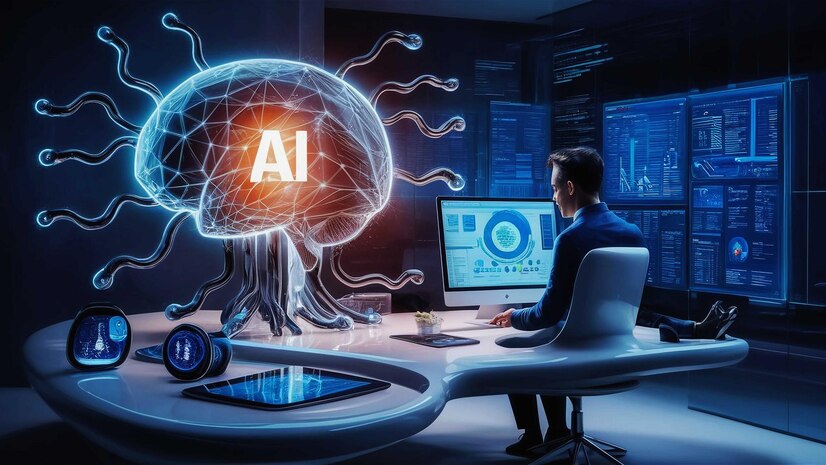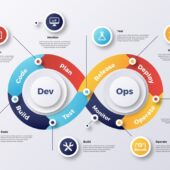Introduction
In 2024, Artificial Intelligence (AI) is more than just a buzzword—it’s transforming industries worldwide, and IT services are no exception. The growing influence of AI is undeniable, and it has become a vital component of modern IT infrastructure. From automating routine tasks to enhancing security protocols, AI is revolutionizing how IT services are delivered and managed. As we move forward, the impact of AI will only deepen, making it essential for businesses to embrace these changes or risk being left behind.
What is Artificial Intelligence?
At its core, Artificial Intelligence refers to machines or systems that mimic human intelligence to perform tasks like problem-solving, decision-making, and learning. AI technologies such as machine learning (ML), natural language processing (NLP), and computer vision enable computers to process large volumes of data, recognize patterns, and act autonomously. These technologies are the driving forces behind AI’s significant contributions to IT services.
The Evolution of IT Services Over the Years
IT services have drastically evolved over the past few decades. In the early stages, IT was largely manual, with technicians handling servers and maintaining hardware on-site. However, with the rise of the internet, cloud computing, and automation, IT services have become more sophisticated. Now, with AI stepping in, IT services are smarter, faster, and more efficient, optimizing processes that once took hours, even days, to complete.
The Growing Influence of AI in IT Services
Artificial Intelligence is revolutionizing IT services in ways we couldn’t have imagined just a few years ago. The growing integration of AI into IT services is driven by the need for greater efficiency, faster response times, and proactive decision-making. From AI-powered cybersecurity to AI-driven customer support, the IT landscape is changing rapidly.
AI in Automation of IT Operations
One of the most significant impacts of AI is its ability to automate IT operations. Gone are the days when IT professionals had to manually handle routine tasks like monitoring systems or updating software. AI-driven tools can now automate workflows, reducing human intervention and minimizing errors. This automation allows IT teams to focus on more strategic initiatives, boosting productivity across the board.
AI-Enhanced Cybersecurity in IT Services
With the rise of cyberattacks, businesses need to stay vigilant, and AI is playing a pivotal role in improving cybersecurity. AI-driven systems can quickly detect anomalies, identify potential threats, and take swift action before any damage is done. In fact, AI-enhanced cybersecurity solutions provide faster detection and response times, making it easier to prevent breaches that could compromise sensitive data.
AI-Powered IT Support and Helpdesks
AI is also transforming IT support services. Have you ever interacted with a chatbot while troubleshooting an issue? That’s AI at work. AI-powered chatbots can handle customer queries, troubleshoot problems, and even resolve simple technical issues. Virtual assistants backed by AI allow companies to provide 24/7 support, significantly improving customer satisfaction and reducing wait times.
Predictive Analytics and Artificial Intelligence in IT Services
Another area where AI is revolutionizing IT services is in predictive analytics. AI can analyze historical data to forecast potential issues within an IT system, allowing teams to take preventive measures before problems arise. For example, AI can predict when a server is likely to fail, enabling proactive maintenance that prevents costly downtime.
AI in Cloud Computing and IT Services
Cloud computing has already transformed the IT world, but with AI, it’s reaching new heights. AI enhances cloud resource management by optimizing storage, bandwidth, and computing power. This results in improved scalability and efficiency, making it easier for businesses to meet fluctuating demands without sacrificing performance.
The Role of AI in Data Management
Managing vast amounts of data is one of the biggest challenges in IT today, and AI is helping solve this problem. AI tools can automate data organization, cleaning, and analysis, freeing up valuable time for IT teams. Moreover, AI can uncover insights from data that humans might miss, providing more accurate business intelligence and decision-making capabilities.
AI’s Contribution to IT Security Management
When it comes to IT security, AI offers a higher level of protection than traditional systems. AI can continuously monitor systems for vulnerabilities, scan for risks, and take action when suspicious activity is detected. Additionally, AI-enhanced user authentication and identity management ensure that only authorized individuals gain access to sensitive information.
Challenges and Ethical Considerations in AI-Driven IT Services
Despite the advantages, adopting AI in IT services isn’t without challenges. Integrating AI systems can be expensive, and businesses must ensure that their teams are adequately trained to work with these technologies. Additionally, ethical concerns around data privacy and the potential for AI to make decisions without human oversight raise important questions about transparency and accountability.
The Future of AI in IT Services
As AI continues to evolve, so too will its role in IT services. In the coming years, we can expect even greater advances in automation, cybersecurity, and predictive analytics. AI’s integration into every facet of IT operations will enable businesses to be more agile, responsive, and secure in a fast-paced digital world.
Conclusion
In 2024, Artificial Intelligence is revolutionizing IT services in ways that streamline operations, enhance security, and boost productivity. From automation to predictive analytics, AI’s contributions to the IT sector are profound, and its future promises even more innovation. As businesses continue to adopt AI technologies, the role of AI in IT services will only expand, making it an essential tool for staying competitive in a rapidly evolving tech landscape.
For the best in Artificial Intelligence services, look no further! Contact us today to discover how our tailored solutions can transform your business and drive success.
FAQs
- What is the biggest challenge in adopting AI for IT services?
The biggest challenge is often the cost and complexity of implementation, as well as ensuring that IT teams are trained to use AI effectively. - How does AI help in IT support?
AI helps in IT support by automating routine tasks like answering customer queries through chatbots and virtual assistants, which significantly reduces response times. - Can AI fully replace human roles in IT?
While AI can handle many tasks, it’s unlikely to fully replace human roles. Instead, it complements IT teams by taking care of repetitive tasks, allowing humans to focus on more strategic work. - What are the security concerns with AI in IT services?
One of the main concerns is that AI systems could be manipulated by cybercriminals. Additionally, there are privacy issues related to how AI collects and uses data. - How is AI used in cloud computing for IT services?
AI optimizes cloud resource management, making cloud systems more efficient by automating tasks like scaling, bandwidth management, and data storage.




